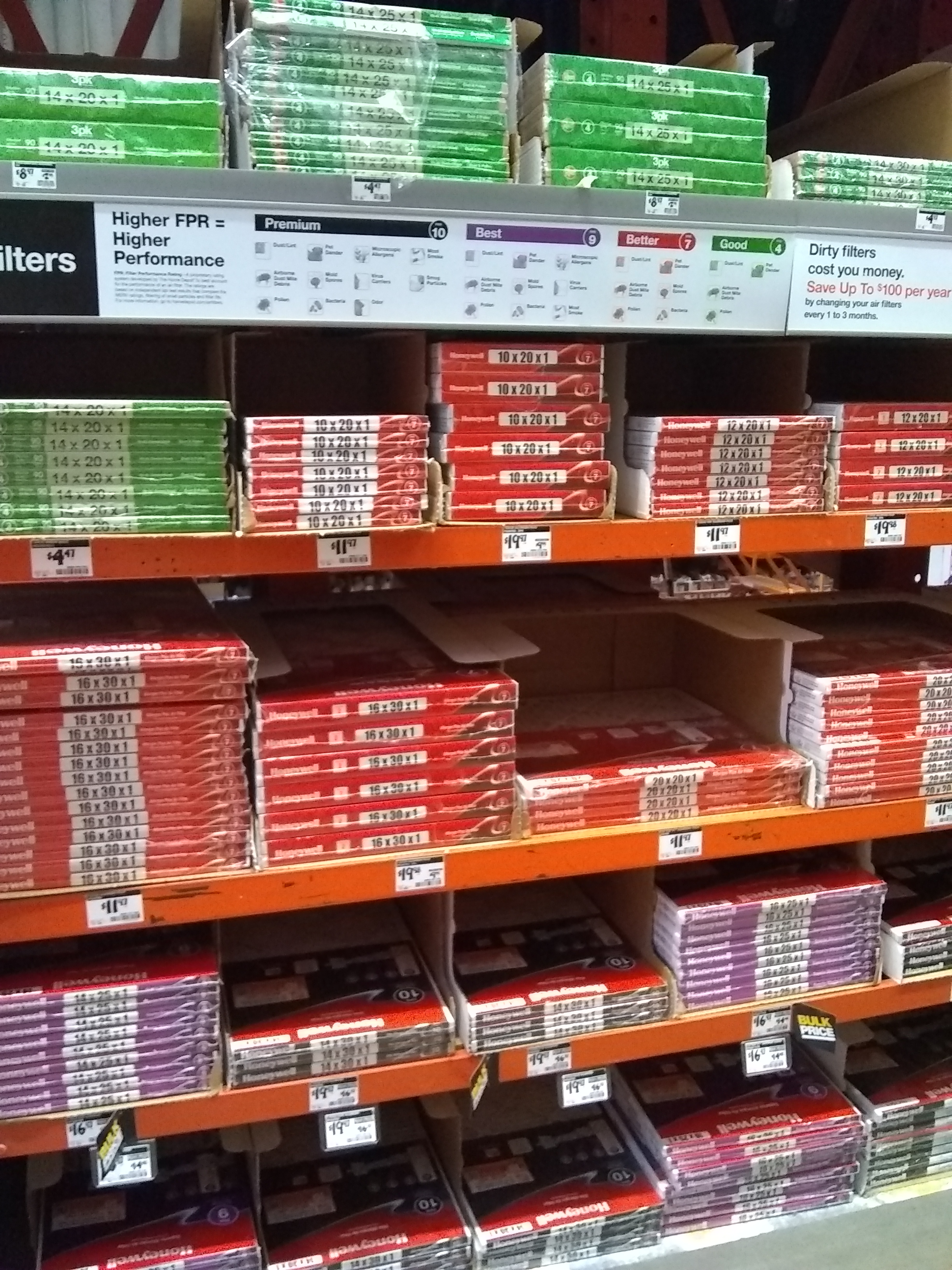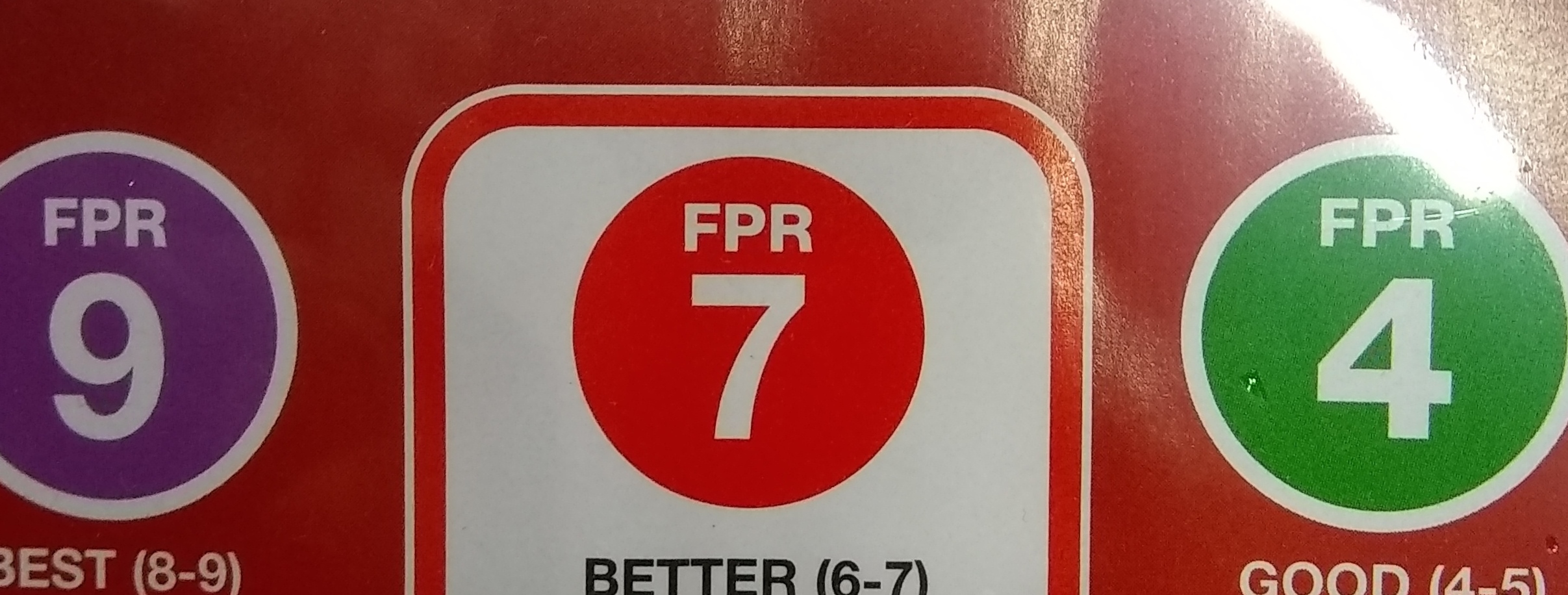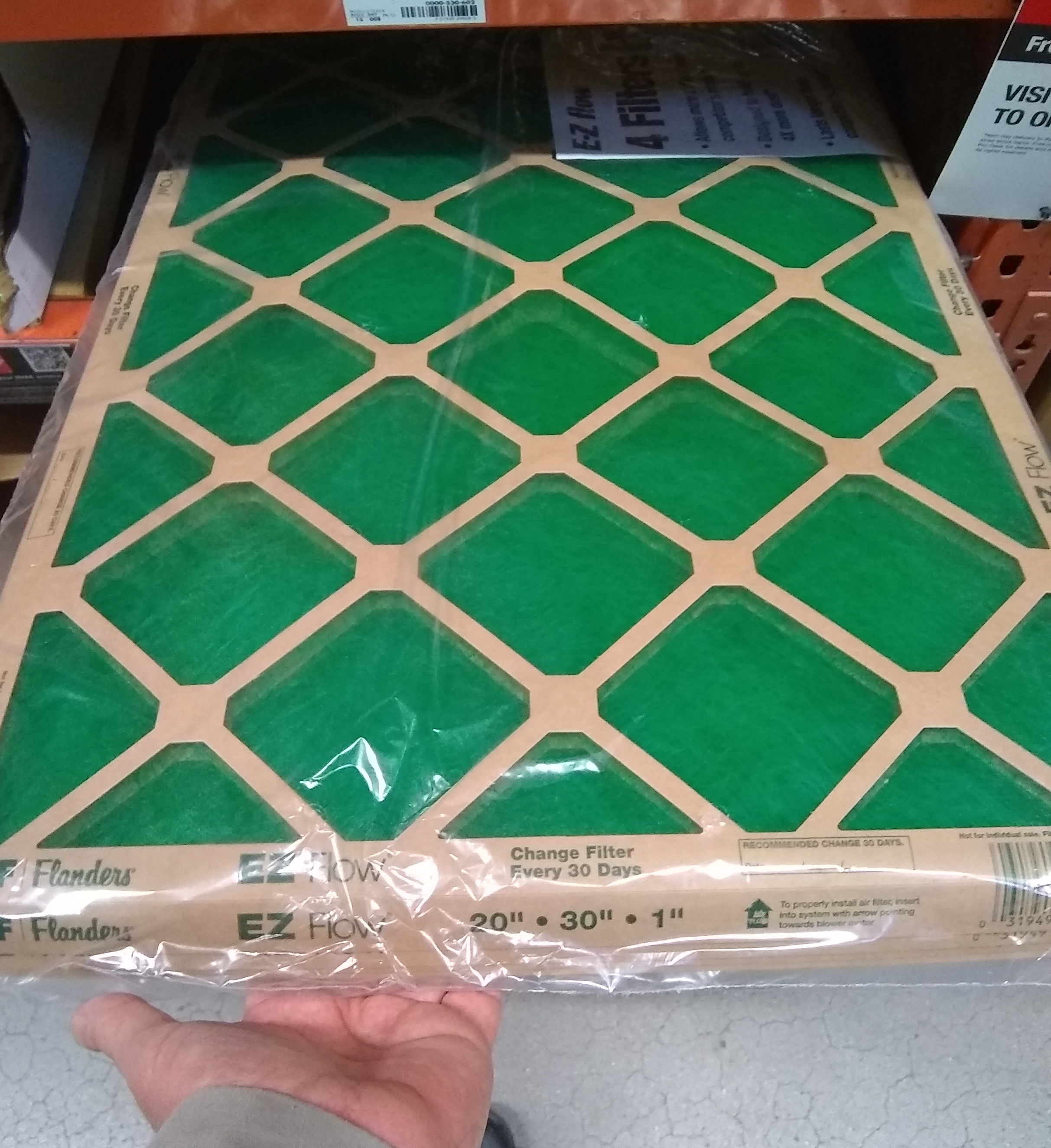A/C and Heat Pump Air Filters
What's The Best Filter To Use?
All A/C, furnace and heat pump systems use an air filter. It must be regularly replaced if you want to keep the system working correctly and if you don't want to unnecessarily waste money for electricity. The question is, what type of filter should we use? There are lots of air filters available now to choose from. Take a look at the filter aisle of a popular local home center.

Wow, look at all those choices! Look at that selection. Which air filter is the best? Which is the right one? Besides the actual size of the filter, is there any other consideration to make when choosing a filter? If you ask the sales associate at the home center that question they will most likely steer you towards a "high performance" air filter. They do this because there is much more profit for the store in selling one filter for $20 than there is for selling a case of them for the same price. Filters are categorized by FPR (also ratings may specify MERV or MPR) as you can see in the picture below.

The higher the FPR (filter performance rating), the more expensive the filter will be generally. More expensive is not always better though, at least not when it comes to air filters. More efficient "high performance" air filters come in a pretty package and they have lots of reassuring technical information on them, and they promise to give you nice clean air and to last for a long time. They promise to save you money. They seem too good to be true.
Let's take a closer look at some of those claims and then contrast them with reality. High performance air filters do not last longer as they advertise, since they trap more material in the filtration process they get dirty faster, not slower. The lifespan of an air filter isn't determined by how much debris it can trap and hold. If this was the case, then yes, a high efficiency air filter will trap and hold more dirt than a standard performance filter would technically. However, visible collected volume of trapped debris isn't a measure of the lifespan of a filter. The lifespan is determined not by its ability to trap more debris, but by its ability to still freely pass air through it. When the filter is unable to freely pass air through it, it is spent and needs to be replaced. A high performance air filter versus a lower performance rated filter of the same size will be spent sooner in the same application generally.
On top of that, the free spaces in the filter media that the air must pass through are smaller, thus creating a higher restriction (pressure drop) when the air passes through it, right out of the package. Even when a high performance filter is still brand new with absolutely no dirt trapped in the filtration media, they are already enormously restrictive generally speaking. When they get dirty then they really become restrictive.
What about the claim that it saves money? I have never seen a case where a high performance air filter saved someone money.
- The cost of four 90 day air filters (supposedly, 1 year supply) may be as much as $60 or $100. A case of standard air filters that will last for 1 year (changed monthly) is approximately $20-$30. That's as much as a $70 loss from using a high performance filter.
- The high performance filter causes a high restriction, which creates a high negative pressure on the return duct, which in turn invites hot air to be drafted into the duct system wherever there is a gap or crack. Air in the attic can be over 135 degrees in the summer and this terribly hot air is being pulled into the gaps and cracks of the entire return system. You have to pay to cool that hot attic air.
- Restrictive filters slow down the movement of air, which often causes diminished air distribution. This can result in hot / cold spots. You may have to turn down the thermostat to a lower setting (unnecessarily wasting electricity) in order to feel cool. This wastes electricity.
- Restrictive filters reduce the amount of air traveling through the air conditioner and across the cooling coil where the heat transfer takes place between the refrigerant and the air. Some systems (if designed in such a way as to accommodate this restriction) are unaffected by a high negative pressure in the return, but most standard efficiency residential systems will have considerable adverse effects occur as a result, including a reduction of capacity and damage to the compressor. The A/C has to run longer and this wastes electricity.
Choosing The Right Filter, Not The Most Expensive
With air conditioning the name of the game is air movement. The more, the merrier. The air conditioner requires a substantial movement of air through it in order to exchange heat from the air to the refrigerant. It is designed for a specific amount of air. If that volume of air is compromised because of a restriction at the air filter, oftentimes this will result in a considerable loss of performance, similar to placing a piece of cardboard over the grill. As a service technician (this article is written by a seasoned HVAC tech), I cannot tell you the number of "no cooling" service calls I have been on that were caused by an air filter that was too restricted to provide enough air flow to keep the unit from freezing up. The filter may have been only slightly dirty by appearance, yet because of the type of filter media used it stopped the air from flowing to the extent that it caused the A/C system to freeze up. Oftentimes the air filter warns us that a freeze up is about to occur. When you can hear a loud air noise at the filter grill, like a jet plane taking off from the airport, and you can see the air filter distorting upward or inward (in normal operation an air filter should always lay completely flat if it is clean and the correct type and size) as though it is getting sucked into the duct, you know the filter is restricted. It needs replaced ASAP!

The recommended air filters directly above are the lowest cost and the least restrictive filter media available. They will give the lowest utility cost and the best cooling / heating performance. Do not use any of the other types of air filers unless a professional HVAC technician has tested and checked your system to verify that a more restrictive filter media may be used in your application. The considerations the technician will take into account are duct size, filter size, length of the ducts, the blower type and rating, and the static pressure measurements of your system. Since most A/C systems in Arizona have ducts that are already marginally sized it is unlikely that you could use a high restriction air filter without causing adverse effects such as longer run times, higher utility costs, shortened lifespan of the system, increased air noise from the return vent and poor air circulation.
As a general rule do not use any of the following types of filters listed below unless a technician has first checked your system to verify that a higher restriction type filtration media is acceptable for your application:
|
The filters below are not generally recommended for residential use. Some of them might appear to initially save money (reusable filters for example) but in the end they will likely cost much more in utility costs and repairs than they will ever save.


Recommended Filter

The filter shown above is from Home Depot. It is called EZ FLOW and it works just like the name implies. It is one of the least restrictive filters available. It comes in a package of four filters and cost approximately $1 each. Unfortunately these type air filters only come in the most popular sizes. If they don't carry your size and you are one of our customers, please call, text or Email us with your filter size and we can get you a supply of low restriction air filters from our supplier.
- Change the filter every month, whether it needs it or not.
- Never attempt to clean a used disposible air filter and then reuse it.
